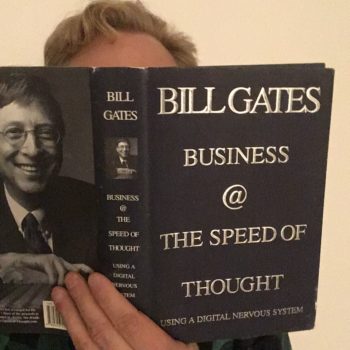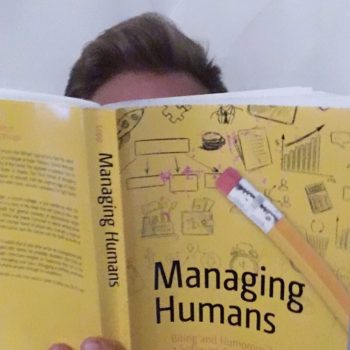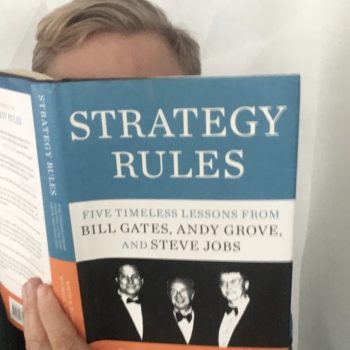
Business @ the Speed of Thought
Using a Digital Nervous System
How strongly do I recommend Business @ the Speed of Thought?
4 / 10
Review of Business @ the Speed of Thought
This book is a glimpse into the mind of Bill Gates back in 1999. Back when, you know, the world generally considered him somewhere between evil and genius. Now only half the population thinks he’s evil, but for wildly different reasons.
For me, the big takeaway of Business @ The Speed of Thought is just how smart Bill Gates is. He sees technological happenings way before they go mainstream.
Overall, you should read this book like a historian. Don’t expect anything mind-blowing, but do think about the context and time which it was written within.
Break out of the trapped data mindset
At the time, Gates was articulating the idea that data should be readily available. Just a few clicks away.
Gates writes, “We need to break out of the mindset that getting information and moving information around is difficult and expensive.”
In addressing Gates’s problem, we’ve made significant advancements. Data is readily available. Everything is digitized.
But while we’ve solved the specific problem, we’re still stuck with the general problem. Data is often trapped in warehouses or a dizzying number of disparate systems.
When data systems are integrated, it’s often done through increasingly expensive platforms like Snowflake and Fivetran.
Teach employees to analyze financial data
To Gates’s mind, smart companies spend less time protecting financial data from employee eyes and more time teaching those employees to analyze, understand, and act on the data. Especially middle managers.
Middle managers need training to understand financial data because middle managers can affect change.
The paperless future
Gates envisioned a world where paper forms and reports went digital. This would both decrease the cost and increase user satisfaction.
We take digitization for granted now. Which makes me wonder – what will we take for granted 20 years from now?
Consumer data rights
Gates writes, “…consumers should be able to approve in advance the use of any personal data and whether that data can be passed on to other entities.”
With regulations like GDPR and CCPA, we’re just getting started with consumer data rights and privacy protection.
In a word, this is… sad. I wish we had more and stronger advocates for consumer data rights. Gates could have been this. He saw the need, but I don’t think he adequately followed through and used his power and position to advocate on behalf of users.
How we evaluate technology work
Gates writes, “The IT job is one where you get an ‘F’ if you fail but only a ‘C’ if you succeed – this stuff is supposed to work, right?”
This fundamentally resonated with me, although I suspect every profession feels this way. Chefs are expected to cook great food. Doctors are expected to provide compassionate and expert care.
For me, the larger message was that work is unrewarding when you only consider external evaluation. To find satisfaction in your work, look within. Evaluate your own effort and growth.
Small personal devices will be everywhere
Gates basically predicts the mobile revolution way before it happened.
To be fair, phones with internet access were in early development in 1999 when Gates wrote this book. So he wasn’t exactly predicting the future.
But Gates was looking at early versions and projecting far out into the future. I still give him credit.


